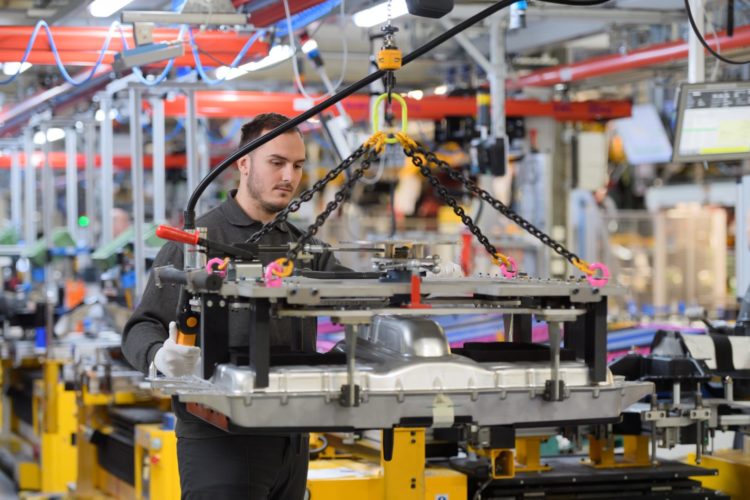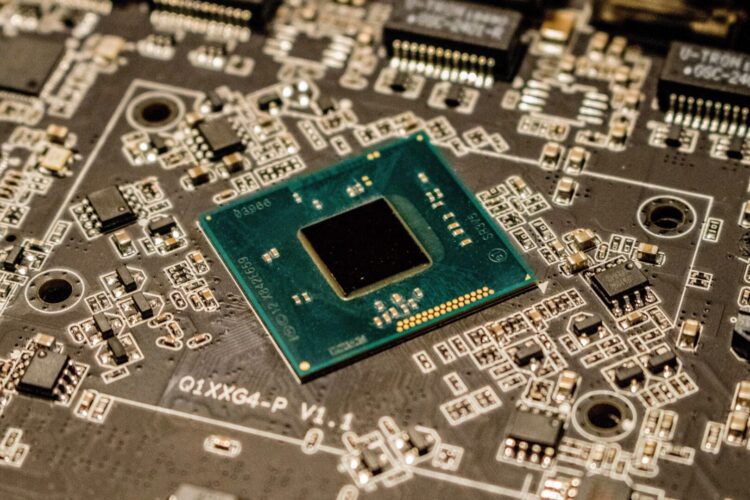Jaguar Land Rover has reported a £110m quarterly loss after having to temporarily halt production at its Merseyside factory due to a global computer chip shortage – but what is the cause of the problem? Report by Kirsten Hawkins and Tony McDonough

Until not so long ago cars were purely mechanical beasts – fundamentally unchanged since the days of Henry Ford.
But in a remarkably short space of time our world, and our daily lives, have become dependent on the expedient wonders of digital technology and motor vehicles are no exception to this. They are now bursting with technology.
Digital systems in vehicles control everything from engine management, driver aids including satnavs, to on-board cameras and radio and communications devices. But this dependence on tech has created a new crisis for the automotive sector when it is still trying to recover from the COVID-19 pandemic.
In April this year, Britain’s biggest carmaker Jaguar Land Rover (JLR) had to temporarily halt production at its Halewood in Merseyside and at Castle Bromwich in the West Midlands. The reason? A global shortage of semiconductor computer chips.
JLR employs more than 3,500 people at Halewood assembling the Range Rover, Evoque and the Land Rover Discovery Sport models. Any shutdown in production is a big deal and costly for the business. And while production has resumed at both sites, the shortage is continuing to cause problems.
A few days ago the sale of the problem was laid bare for JLR when it revealed pre-tax losses of £110m for the three months to June 30 from revenues of around £5bn. It put the blame mostly on the disruption caused by the chip shortage. And it expects the situation to get worse before it gets better.
In a trading update it said: “We are encouraged by the continuing recovery in sales and the very strong demand for our products with record order books. However, the global shortage of semiconductors continues to be a challenge which has constrained our financial results in the first quarter.
“The shortage of semiconductors is presently very dynamic and difficult to forecast. Based on recent input from suppliers, we now expect chip supply shortages in the second quarter ended September 30, 2021, to be greater than in the first quarter, potentially resulting in wholesale volumes about 50% lower than planned.”
Other automakers such as General Motors, Ford, Renault and Honda have also been affected. Stellantis, which owns the Vauxhall factory in Ellesmere Port, said it would have to replace digital speedometers with old-fashioned analogue ones in one of its Peugeot models.
Mike Hawes of the UK’s Society of Motor Manufacturers and Traders (SMMT) says car production is still not at normal levels. And the two reasons for that are staff shortages caused by covid and lack of semiconductors.
According to the SMMT, June saw only 69,097 cars being manufactured – the lowest figure for the quarter since 1953 (2020 was lower but this was due to a complete halt in production to the first COVID lockdown.
In the first half of 2021, the UK produced 498,932 cars – this is over a third less than the five year average (38.4% down) and equates to £8.5bn in losses. Cutting back staff hours on the production line was one measure manufacturers took.
According to Mr Hawes the semiconductor shortage may still be around in 2022. He said: “We were expecting to make just over 1.05m cars this year, but due to semiconductor shortages and other issues, we will be about 100,000 cars lower.”
What is causing the chip shortage?
At the start of the pandemic in early 2020 chip factories, particularly in the Far East in countries such as Taiwan, the pandemic caused factories to shut down production. At first this wasn’t so much of an issue as a decline in orders from manufacturers eased the pressure on demand.
However, as more and more people were sent home to work the demand for laptop computers and other tech for the home began to soar. Demand for semiconductor chips suddenly picked up and the industry was unable to meet it. A fire at a Japanese factory making semiconductors for the car industry has worsened the shortage.

Tom Coughlin, fellow at Institute of Electrical and Electronics Engineers in the US, said: “During the pandemic some of these semiconductor fabs (fabrications) and many of the manufacturers of the components, equipment and materials used to manufacture semiconductors experienced shutdowns and slowdowns in their manufacturing.
“In addition, many of the customers of semiconductor chips, reduced their orders on chips during the early days of the pandemic, as they expected reduced demand for their products.”
Now the chip manufacturers can’t make them fast enough. Intel is building a new $20bn factory in Arizona but that won’t come on line for at least two years. Intel chief executive Pat Gelsinger believes the shortage could last into 2023.
“We have a long way to go yet,” he said. “It just takes a long time to build (manufacturing) capacity. Our estimates are that it’s probably two years for the industry to work through it because, as you say, it takes a while to build a fabrication, or a fab, as we like to call it in the industry.”
Although automotive has been the worst affected so far, the chip shortage is impacting on other industries as well. Apple and other mobile phone manufacturers are anticipating shortages as are makers of games consoles.
JLR is expecting to take another hit in the current quarter at least. And Mike Hawes of the SMMT says the outlook will continue to be uncertain. He added: “Some of the countries that produce them (semiconductor chips) now have rising COVID cases so we don’t know how that will affect production going forward.”

